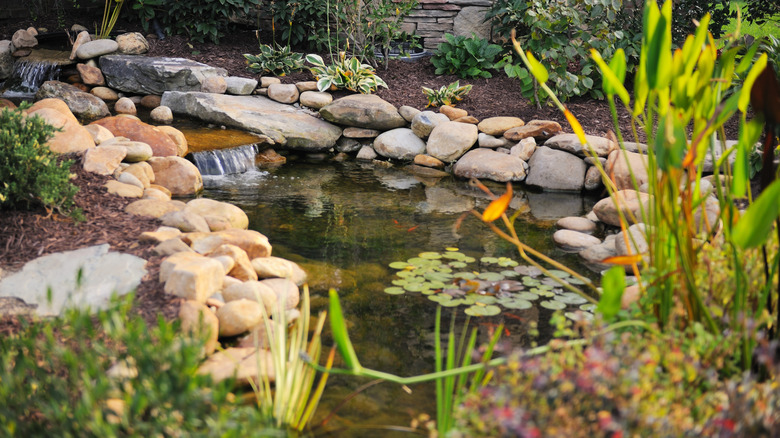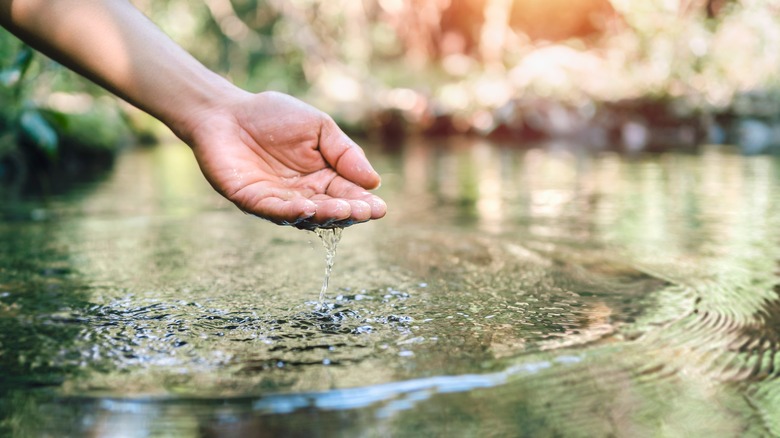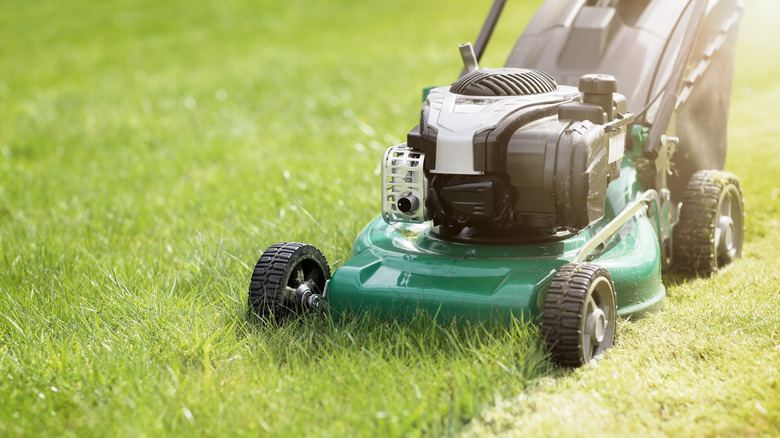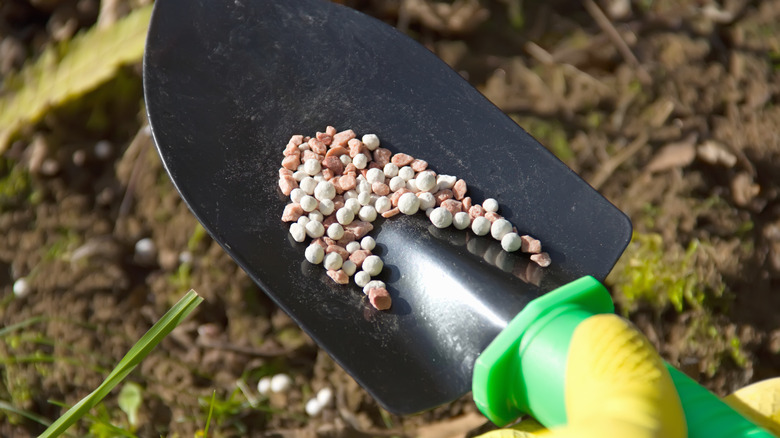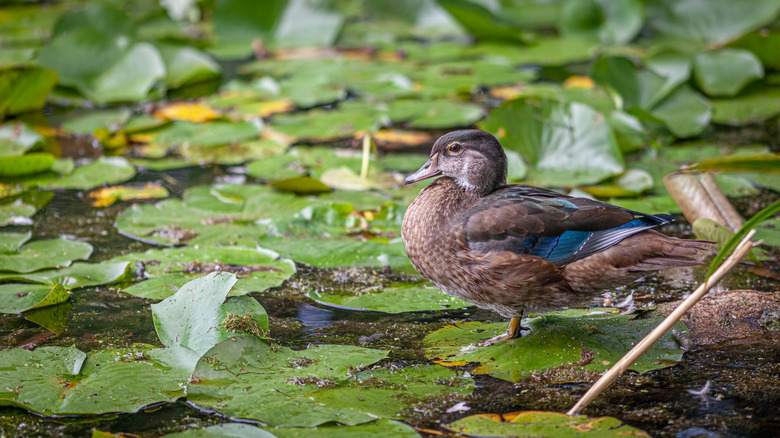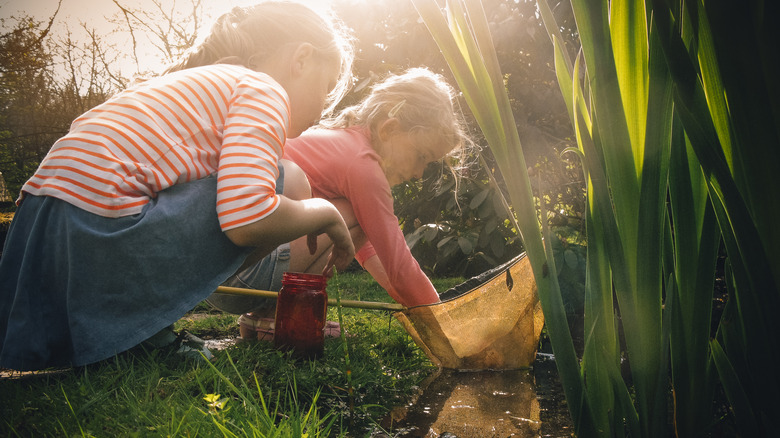Environmental Benefits Of Adding A Pond To Your Garden
A garden tends to be one of the most enchanting and prized areas of a home. With all the hours and hard work we put into weeding, planting, and pruning, it's undoubtedly something to be proud of. Gardens offer us more than just beauty; they also give us an excuse to exercise and get adequate time in the sun, and they are great for the environment. Our plants help clean the air and provide essential resources for birds, bees, and butterflies. A pond can also help make a positive impact on the environment. Ponds can be fun DIYs, or a professional can handle all the ins and outs, but regardless of how the pond comes about, it will surely benefit the environment.
Ponds are a wonderful way to save water in a world that struggles with conserving resources. You'll also be clearing up a large area of grass, ultimately cutting down on your lawnmower usage and thus reducing those pollutants. Did you know that a pond's waste can be used as fertilizer as well? The goopy algae and sludge might be unappealing, but it will provide natural nutrients for your plants. And let's face it: While attracting wildlife like fish, frogs, and dragonflies is vital for Mother Nature, we can't help but love all the lively new guests. Advocating for the planet is as important now as it has ever been, and you can start making a difference with just a pond.
Conserving water
Maintaining a happy and healthy garden comes with an intense watering schedule, and it's easy to overlook just how much water we are using. The United States Environmental Protection Agency (EPA) estimates that the typical American household will use 320 gallons of water each day, with 30% of that being put towards outdoor needs such as the watering of grass and gardens. Clean pond water can be used on flowers and crops and decrease the amount we are pulling from the tap.
Pond water can often refill itself with rainfall, and when it comes to the maintenance of your pond, you'll only need to do a top-off and water change once a week with at least 10% of the reservoir. Often, you can simply use what you have taken from the pond during a water change and apply that to your garden, ensuring no drop goes unused. Conserving water won't just help lower your monthly bills; it's also an essential part of maintaining the earth and avoiding water shortages that plague the globe.
Decreasing mowing pollutants and gas usage
Mowing our lawns is a dreaded and humdrum yet necessary part of keeping our properties clean and tidy. Nothing is more exhausting than going outside on an 80-degree summer day and pushing a machine around in the sun for hours. But, the tiring task affects more than just our energy and time. The EPA finds that 54 million Americans crank up their lawnmowers for a weekly grass trim, which results in 800 million gallons of gas used each year (via People Powered Machines). The EPA also attributes 5% of the United States air pollution to gas-run mowers. Lawnmowers and engines alike send carbon monoxide, nitrogen oxide, and other pollutants into the atmosphere.
Additionally, the diesel fuel, propane, and gasoline we use on a daily basis come from the non-renewable resource petroleum. It is crucial that we avoid wasting gas when we can. Eco-friendly lawnmowers are on the market, but in general, mowing less has helpful benefits. Simply removing a large grassy area that would need to be mowed in favor of a pond makes a bigger difference than one might initially think. You see, it's all a domino effect; the pond that helps cut back on gas and pollution will, in turn, provide water for plants that absorb carbon dioxide and infuse our air with fresh oxygen.
Using fewer fertilizers
While we want to feed our gardens plenty of nutrients to grow strong and healthy, the overuse of fertilizer products is quite harmful to the environment. Much of the fertilizer we apply to our crops runs off and contaminates water sources. The run-off will frequently produce an overpopulation of algae that is harmful to marine life, leading to dead zones in the water from low oxygen levels. It can even be toxic for anything or anyone that consumes water from these sources, including wildlife, people, and our beloved pets. "About a half million tons of pesticides, 12 million tons of nitrogen, and 4 million tons of phosphorus fertilizer are applied annually to crops in the continental United States," says the EPA.
Luckily, pond sludge makes an effective and eco-friendly fertilizer for your garden. The build-up in ponds contains lots of nitrogen, phosphorus, and potassium from things like decomposing sticks and leaves. You can apply this to your plants by mixing it into the soil, layering it on top, or using it similarly to how you'd use mulch. Flowers like marigolds, zinnias, geraniums, and hibiscus are just some that are incredibly receptive to this type of natural fertilization. However, it would be best to dry the pond sludge before application to avoid harmful bacteria and be sure not to overdo it. It is also advised to avoid applying to any crops you plan to eat raw and fresh from picking. You may not have a large farm, but significant changes can start small in your garden.
Supporting wildlife
Supporting local wildlife is an effortless way to help the environment and protect threatened or endangered species. A pond can be home to many fish, including koi fish, goldfish, hi-fin sharks, and smaller fish like minnows that will make their way into the water. But, you'll attract much more than fish to a garden's pond. You can also expect to find tadpoles, toads, turtles, and ducks. Deer may be likely to pop by for a summer's day drink, and helpful insects like dragonflies, ladybugs, and praying mantises will be venturing around.
You can encourage a wildlife presence near your pond by adding rocks along the edges, crafting potential nearby nesting areas, and planting small trees and shrubs close by. Having a pond in your garden will require you to stay on top of pests like mosquitos and aphids, but friendly guests like toads and spiders will help take care of those. Ducks are also great for snacking on slugs and invasive weeds and are unlikely to make a meal of your crops along the way.
Creating environmental awareness
One of the first steps in making a positive impact on our environment is spreading awareness, and it can start young by teaching children about Earth Day or letting them help create a pond to help benefit the environment. The Intergovernmental Science-Policy Platform on Biodiversity and Ecosystem Services (IPBES) has reported that 87% of the earth's wetlands have been destroyed over the course of the last 300 years. "In just over three decades from now, an estimated 4 billion people will live in drylands," Professor Robert Sholes told IPBES. "By then, it is likely that land degradation, together with closely related problems of climate change, will have forced 50-700 million people to migrate."
Building a pond in your garden is the perfect DIY project this summer to get the kids or grandkids involved in outdoor activities and learning about the ecosystem. It'll be the perfect conversation piece when guests come over on sunny afternoons and a relaxing place for you to retreat into nature. And, you'll have peace of mind knowing all the small-to-big ways one pond can make a difference to our planet. When all is said and done, it's a project you'll be proud of and one you'll enjoy caring for even more.
